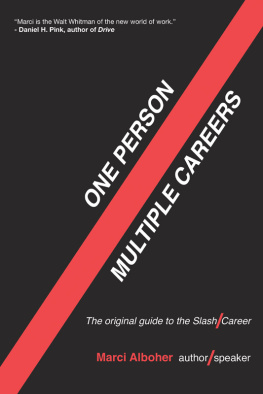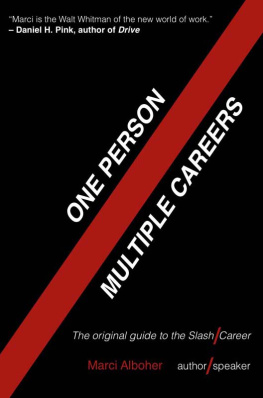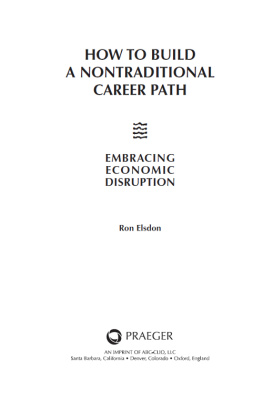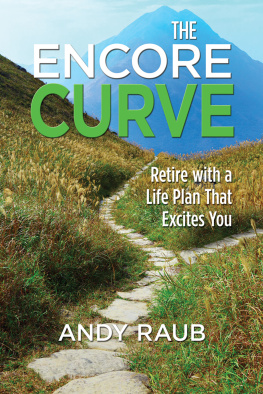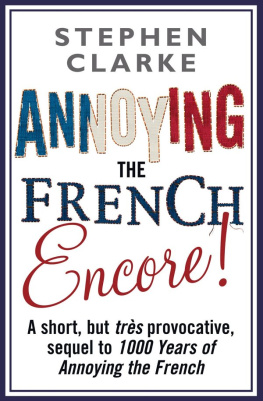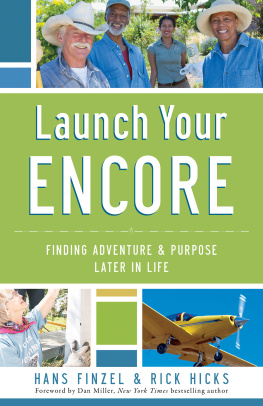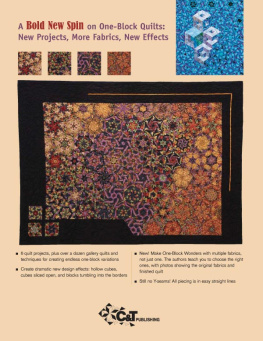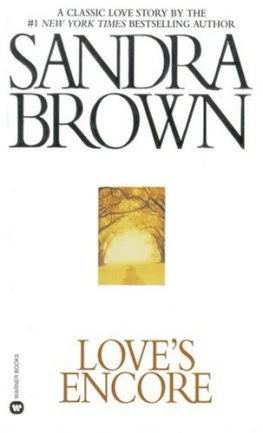THE
encore career
HANDBOOK
Marci Alboher
Introduction by Marc Freedman
WORKMAN PUBLISHING NEW YORK
Dedication
For my father, who never had time for an encore, but whose life lessons live on.
For Jay, my love, who makes me smile with my heart.
And for Marc Freedman, I hope the book carries forward the movement in a way that makes you proud.
Contents
Introduction
A New Map of Life
Youve heard it all before. A gray wave of boomers is careening toward the second half of life, hitting retirement age, morphing suddenly into senior citizens, and bringing with them a new era of cross-generational conflict and economic despair.
Dont believe it. Those of us at midlife and beyond are far from the scrap heap. We are poised to invent an entirely new stage of lifethe encore yearsbetween the end of midlife and anything resembling old-fashioned retirement.
Society brands us the young-old or the working-retired. Maybe they should just call our predicament the oxymoronic years. On the one hand, were implored to hang on to our former youthsixty is the new forty, its said. On the other, senior discounts are dispensed indiscriminately at fifty or sixty. Im all for saving a buck, but the broader choice seems to be cling to the past or risk being sent off to some premature pasture.
But sixty is not the new forty any more than it is the old seventy or eighty. Its the new sixty. And, for that matter, fifty is the new fifty. Indeed, the whole post-midlife period is simply new territory, and those of us flooding into this phase constitute a phenomenon unique to the twenty-first century.
Inventing life stages is anything but new. A hundred years ago, there was no adolescence (until it was invented by a sixty-year-old psychologist, G. Stanley Hall, in 1904). Look further back, and childhood barely existed. Retirement as we know it is a man-made concoction of the postWorld War II era.
With close to 10,000 women and men a day crossing the midlife divide, its high time to accelerate the social invention that is the encore years.
This new project starts with embracing life beyond fifty as a distinct period with its own integrity, even if it has yet to acquire its own language. Its an age increasingly characterized by new perspectives, new priorities, and the capacity to do something with those hard-earned insightsnot just to leave a legacy, but to live one.
It also means recognizing that for most of us this period is a new stage of work, every bit as much as a new stage of life (who wants to play thirty years of golfand who can afford it?). Indeed, a movement is afoot to fashion this next chapter into something we can genuinely look forward to.
Millions are trading in the old dream of the freedom from work for a new one animated by what might be called the freedom to work. They are embracing encore careers, forging a new hybrid between the spirit of service and the practicality of continued income, looking for productive engagement that is not only meaningful but also means something beyond themselves.
The encore career movement holds the potential to create richer lives and a better society.
Some argue that this simply amounts to making virtue out of necessity. True enough, but whats wrong with virtue, or for that matter facing reality squarely and with ingenuity?
That goes for the nation, too. We simply cannot afford to write off the most experienced segment of the population, consigning them to spend half their adult lives in a state of enforced leisure at a time when that group is set to double in sizeand at a juncture when the challenges facing the country in areas like education, health, and the environment are themselves spiraling.
The encore career movement holds the potential to turn this all around, to create richer lives and a better society. And to do so on a grand scale. It promises the biggest potential human capital windfall since millions of women broke through to new productive roles in the 1960s and 1970s.
Pulling off a similar transformation in roles for those approaching the second half of life will require a string of innovationsamong them better pathways for the millions who want to take their encore careers from aspiration to action. All too often, this passage has been a do-it-yourself proposition, a rocky road with little guidance and plenty of pitfalls along the way.
But now help is on the way. You are holding in your hands something thats long been missing: a trusted guidebook for all those ready to live out a new vision for the second half of adulthood, prepared to make a monument out of what so many have dismissed as the leftover years.
This is good news as the great midlife migration gathers size and momentum, and its good news for the future. Like those pathbreaking women who rewrote the rules several decades ago, todays encore pioneers are at the vanguard of a permanent change. They are the first wave passing into this new stage where the golden years once stood, a phase soon to be occupied by all those longer-living children and grandchildren coming quickly on their heels.
By making this new period something truly significant, we are in a position to set in motion an ongoing payoffand in the process to revamp the nature of all the preceding life stages, opening up options for younger people who can make life decisions with the expectation of more than one bite at the apple.
Thats why we all have a stake in this project. Its our best chance to turn the purported paradox of longevitygood for individuals, terrible for societyinto a vast payoff for all, right now and for generations to come.
Marc Freedman
Founder and CEO, Encore.org
Chapter 1
Its Time for Your Encore
Twenty years from now, youll be more disappointed by the things you didnt do, than by the ones you did do.
Mark Twain
In the past one hundred years, the average life span in the United States has expanded from forty-seven to seventy-eight years. By any account, longer lives should be a cause for celebration. But all this extra time can also create anxiety.
Like Betty Friedans housewife in The Feminine Mystique, millions of people are grappling, alone, with a nameless problem shared by millions of others. What do we do with these additional years? How do we make use of this extra time while we are still vital and engaged? And how do we pay for all that extra time? We wonder how to leave a legacy, contribute, and make moneyand, if were lucky, find our bliss along the way.
You probably picked up this book because youre facing a similar question. Youve hit a wall, lost a job, or are just wondering Is this all there is? Maybe your retirement plan has been shattered. Maybe the word retirement doesnt even resonate with you. You may be forty and thinking about planning for another thirty years of work, or fifty-five and thinking of a ten- or fifteen-year third act, or seventy and wondering how to find a part-time job that would add money and meaning to your life.
The good news is that you still have time: Time to follow, or discover, your passion. Time to do something that matters. Time to help yourselfand others, too. We all have more time to make the most of our lives.
Second Acts for a Better World
Theres a new trend afoot. Growing numbers of baby boomers are rewriting the narrative of twenty-first-century midlife by crafting a new stage of work: an encore career for the greater good. These pioneers have realized that with midlife comes a newfound capacity to tap into their accumulated experience and wisdom to accomplish new things, often in ways they were unable to do earlier in their lives.


